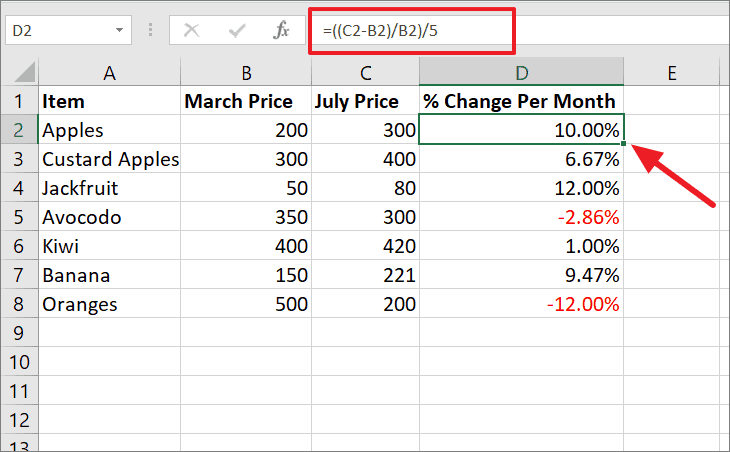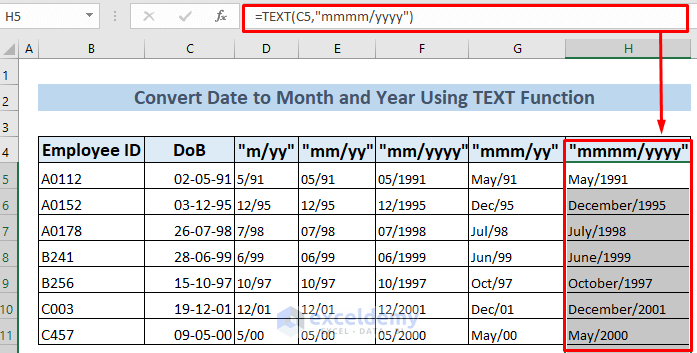5 Ways to Calculate Percentage Increase in Excel Easily

Calculating percentage increase in Excel can be incredibly useful for a variety of applications, from financial analysis to tracking project progress or monitoring business growth metrics. Excel's power in performing rapid calculations provides a seamless way to work with percentages, making it an essential tool for both beginners and seasoned data analysts. Here, we'll explore five straightforward methods to calculate percentage increase in Excel, ensuring you can apply these techniques efficiently in your spreadsheets.
Method 1: Simple Percentage Increase Formula
The most straightforward way to calculate percentage increase is by using a simple formula. Here’s how:
- Select the cell where you want to display the result.
- Type in the formula:
=((New Value - Old Value) / Old Value) * 100 - Press Enter to calculate the result.
📝 Note: Ensure both New Value and Old Value are referenced correctly to get accurate results.
Method 2: Using Cell References
If your data is spread across cells, you can reference those cells directly:
- Let’s say the old value is in cell A1, and the new value in A2.
- Type this formula in another cell:
=((A2 - A1) / A1) * 100
This method is particularly useful when dealing with a large dataset where numbers are constantly changing.
Method 3: Percentage Format
Excel offers a quick way to display numbers as percentages:
- After entering your formula, right-click on the result cell.
- Select “Format Cells” from the menu, then choose “Percentage.”
- Set the decimal places to your desired level of precision.
🔍 Note: The percentage format adjusts the cell content to show the value as a percentage, making it visually appealing and easier to interpret.
Method 4: Conditional Formatting for Visual Impact
Enhance your spreadsheet’s readability by applying conditional formatting based on percentage increase:
- Select the cells where you want to apply conditional formatting.
- Go to “Home” > “Conditional Formatting” > “New Rule.”
- Choose “Use a formula to determine which cells to format.”
- Enter the formula:
=A1 > 0to highlight positive increases or=A1 < 0for decreases. - Set the formatting to your preference (e.g., color, icons).
This visual cue helps in quickly identifying trends and anomalies in your data.
Method 5: Using Pivot Tables for Data Analysis
If you’re dealing with large datasets and need to calculate percentage increase alongside other analyses:
- Create a pivot table from your dataset.
- Place the field you want to analyze (like sales or growth metrics) in the Values area.
- Add another Value field with the same data, but set its “Show Values As” to “Percentage Difference From” and select the base item as the first value in your data set.

| Month | Sales | Percentage Increase |
|---|---|---|
| Jan | 1000 | |
| Feb | 1200 | 20.00% |
This method is particularly effective for dashboards where you need to visualize changes over time or across categories.
The methods described above provide a comprehensive toolkit for anyone looking to calculate percentage increase in Excel. Whether you're a student, a business analyst, or someone simply tracking personal finances, these techniques will streamline your data analysis tasks. Each method offers its unique benefits, from the simplicity of direct formulas to the advanced analytics provided by pivot tables. Remember, the key to mastering Excel is practice and understanding how these functions can be adapted to various contexts. With these skills, you can now handle percentage increase calculations with ease, transforming raw data into insightful information for decision-making or reporting.
Why should I use percentage increase?
+Calculating percentage increase helps in understanding growth rates or changes in metrics over time, which is essential for financial analysis, project management, and performance evaluation.
Can I apply these methods to calculate percentage decrease?
+Absolutely! Simply adjust the formula by subtracting the new value from the old value or changing the sign in the equation to calculate percentage decreases.
Is there an Excel function specifically for percentage calculation?
+Excel does not have a dedicated function for percentage increase, but the methods outlined above use standard Excel formulas to achieve this calculation effectively.
Related Terms:
- excel calculate % change
- hike calculator in excel
- google sheets percentage increase formula
- increase by % in excel
- excel percent increase decrease formula
- excel % increase or decrease



